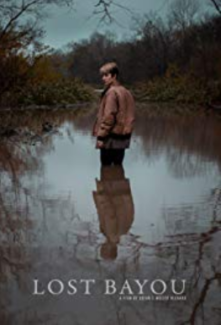Lost Bayou (Brian C. Miller Richard, 2019): USA
Reviewed by Larry Gleeson. Viewed at the 50th Anniversary of the Nashville Film Festival.
 Lost Bayou, a film from Director/Producer Brian C. Miller Richard, made its Southeast Premiere at the 50th Anniversary of the Nashville Film Festival. Lost Bayou is a poetic portrait of a Cajun Traiteur and life out in the Atchafalaya Basin, the largest river swamp in the United States. Richard set out to make a film about Cajun life in the Basin having grown up and lived there most of his life. Nick Lavin and Hunter Burke wrote the screenplay that deals with a young woman, who appears to have an addiction, and her connection with her faith-healing father.
Lost Bayou, a film from Director/Producer Brian C. Miller Richard, made its Southeast Premiere at the 50th Anniversary of the Nashville Film Festival. Lost Bayou is a poetic portrait of a Cajun Traiteur and life out in the Atchafalaya Basin, the largest river swamp in the United States. Richard set out to make a film about Cajun life in the Basin having grown up and lived there most of his life. Nick Lavin and Hunter Burke wrote the screenplay that deals with a young woman, who appears to have an addiction, and her connection with her faith-healing father.
The film opens with a piece of footage bordering on the macabre that sets the tone as a man in a swamp states he was declared legally dead by a medical doctor only to wake up with a man kneeling over him praying. A fade to black transition reveals the story’s main character, Gal, portrayed by Teri Wyble, in a vehicle popping a bill and chasing it down with a swig of hard liquor. She asks the driver to wait for her as she exits the vehicle. The driver takes off kicking up chat. Apparently, Gal forgot what day it was and missed her young son’s birthday.
A fortuitous call comes in from Gal’s father, Pop, portrayed by Dane Rhodes. Pop speaks with a Cajun dialect and requests that Gal come home as her mother has a serious complication. The only issue is Gal’s mother has been deceased for two years. Gal finally agrees after Pop’s insistence. After the call ends, a bird flies into Gal’s door. Gal picks up the lifeless bird and takes it to the water whereupon a surreal moment takes place with a French prayer and the bird begins moving under its own power.
Needless to say, when Gal gets down to Pop’s floating raft-house the situation is about life and death and who decides who can cross the divide and when. Pop feels the swamp allows for better communication with his God, whereas Gal believes not knowing and not believing “ain’t such a bad thing.” Along the way, several tense moments and sharp camera operation kept my attention focused and the life in the bayou is revealed in a southern gothic style. Life on the bayou has its unique ways and Richard manages to let us in on it stylistically.
The film’s production values are strong. Exquisite cinematography from Natalie Kingston, production design by Mark and Matthew Whittle, and Mehgan Cornay’s costuming deliver an ethereal feel to the film while realistically capturing life in the region. The musical score was provided by the Grammy award-winning Lost Bayou Ramblers. The Ramblers are known predominantly for their acoustic Cajun style and seem to hit the right notes and melodies to drive the emotionality of the film’s scenes. The editing team of Richard and Robert Grigsby Wilson stitch and weave images in a seamless continuity. And, from an acting standpoint, Wyble does most of the heavy lifting. Rhodes adds a powerful presence honed from his theatrical stage work and the ensemble cast worked very well.
In the Q & A following the film, Richard revealed the inner workings of the project. Numerous members of the team had close relative working on set including Richard’s own father. With a run time of 87 minutes, the film seemed a tad short….probably because I wanted to see more!
Highly recommended!
About this entry
You’re currently reading “Lost Bayou (Brian C. Miller Richard, 2019): USA,” an entry on Student Film Reviews
- Published:
- 10.14.19 / 9am
- Category:
- Films
No comments
Jump to comment form | comments rss [?]